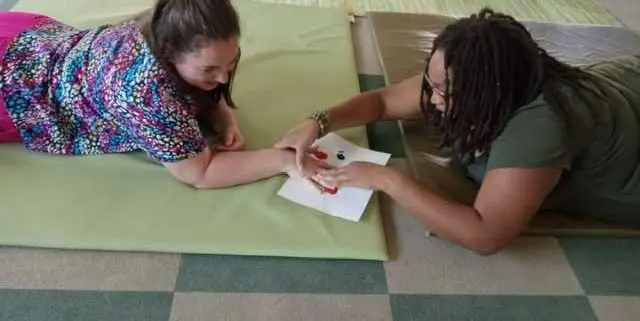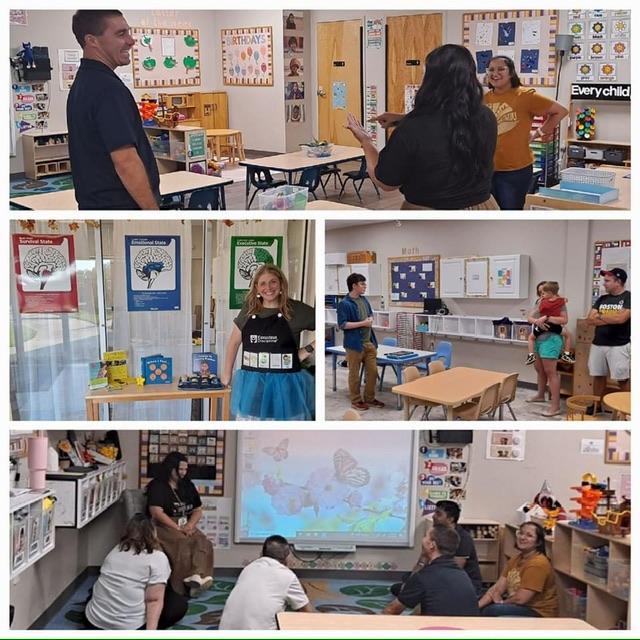Parents Experience ‘Night in Their Child’s Shoes’ and Learn About Conscious Discipline
Earlier this month, Parker-Chase Sprayberry invited families in for a special “Night in Your Child’s Shoes” event. Families were able to experience the school the way their children do as they explored their classrooms with a quick sample schedule of the day. This was a great opportunity for families to learn more about our curriculum and enrichment programs.
We also had a special information session on Conscious Discipline, in which families got to practice “I love you rituals” and learned ways to work out conflicts!

What is Conscious Discipline?
Conscious Discipline is an important part of the Parker-Chase Preschools curriculum. Developed by Dr. Becky Bailey during the 1990s, conscious Discipline is a comprehensive social and emotional learning framework that prioritizes building safe and connected relationships as the foundation for optimal development. Rooted in neuroscience and child development research, this approach views challenges not as disobediences to be punished but as opportunities to teach self-regulation and critical life skills.
In early childhood education, Conscious Discipline plays a pivotal role for several reasons:
- Brain Development: Young children are in the crucial stages of brain development. By understanding the three primary brain states (survival, emotional, executive), educators can tailor their responses to better support children transitioning from reactive to more regulated, problem-solving states.
- Safety and Connection: Children learn best when they feel safe and connected. Through routines, rituals, and specific interventions, Conscious Discipline helps educators create classrooms where children feel a sense of belonging, enhancing their readiness to learn.
- Skill Building: Instead of relying on external rewards or punitive measures, this approach equips children with essential life skills such as empathy, responsibility, and self-control. By focusing on internal motivation, it sets the stage for lifelong positive behavior and decision-making.
Conscious Discipline is a useful tool that helps transform early childhood classrooms into nurturing communities where educators impart academic knowledge and mold emotionally resilient, connected, and self-aware individuals.
‘I Love You Rituals’
“I Love You Rituals” are a series of intentional activities, rhymes, and games designed to foster connection, improve attention span, and enhance self-esteem in children. Rooted in the principles of Conscious Discipline, these rituals are built on the understanding that a strong bond and emotional connection between caregivers and children are foundational for optimal brain development. By employing gentle touch, eye contact, and playful situations, the rituals create moments of shared joy and intimacy, reinforcing the message that children are loved and valued.
Whether it’s through song, touch, or playful engagement, these rituals help to wire the brain for cooperation and impulse control by creating positive neural pathways. Furthermore, by emphasizing safety and connection, they help children develop a sense of belonging and significance, leading to better socio-emotional outcomes and enhancing overall development.
In essence, “I Love You Rituals” provide a toolset for caregivers to nurture and deepen their relationships with children, ensuring that the bond is based on unconditional love and trust.
Conflict Resolution Tips
One of the central tenets of Conscious Discipline is the recognition that individuals, both children and adults, may not have developed the necessary skills to handle conflicts constructively. Instead of punitive measures or authoritarian responses, Conscious Discipline teaches individuals to become more self-aware of their emotions and reactions in the heat of a conflict. By encouraging mindfulness and self-regulation, individuals can pause, reflect, and respond thoughtfully rather than react impulsively. This helps in de-escalating conflicts and promotes empathy and understanding among all parties involved.
Here are five Conscious Discipline techniques to help resolve conflicts:
- Emotional Regulation: One of the core principles of Conscious Discipline is teaching individuals, particularly children, how to regulate their emotions. By understanding and managing their feelings, individuals are better equipped to approach conflicts with a calm and composed mindset, reducing the likelihood of escalating tensions.
- Time-In: Instead of traditional time-outs or punitive measures, Conscious Discipline encourages a “Time-In” approach. This involves providing a safe and nurturing space for individuals to process their emotions and thoughts, helping them gain self-awareness and self-control before addressing the conflict.
- I Messages: Conscious Discipline teaches the use of “I messages” to express feelings and needs. This approach encourages individuals to take responsibility for their emotions by saying things like “I feel upset when…” or “I need help with…,” fostering open and non-confrontational communication.
- Conflict Resolution Time: Designated periods for conflict resolution are established, allowing individuals involved in the conflict to come together and discuss their feelings and perspectives. This structured approach promotes active listening, empathy, and collaborative problem-solving.
- Problem-Solving Steps: Conscious Discipline outlines a series of problem-solving steps that individuals can follow to resolve conflicts effectively. These steps typically involve identifying the problem, brainstorming solutions, evaluating options, and selecting a mutually agreeable resolution.
Our staff is always available for parents who want to learn about our curriculum, including the various pedagogical techniques we utilize every day, to make children’s education a joyous and beneficial experience. If you would like to learn more, click here for contact information.





